Jun 21, 2025 – Day 2 of JTS Workshop in Zhemgang, Bhutan, Pantang Completion Ceremony
Hello. Today is the second day of the sustainable development project workshop jointly held by JTS and the Bhutanese government in Zhemgang.
Sunim began his day at the accommodation in Zhemgang after completing his morning practice. After finishing breakfast prepared by the accommodation at 7:40 AM, Mr. Norbu, the planning officer of Zhemgang, brought his daughter to greet Sunim. He asked Sunim to give a blessing for his daughter. Sunim applied fragrant water to the child’s forehead and crown, chanted while placing prayer beads around her neck, and then asked Mr. Norbu.
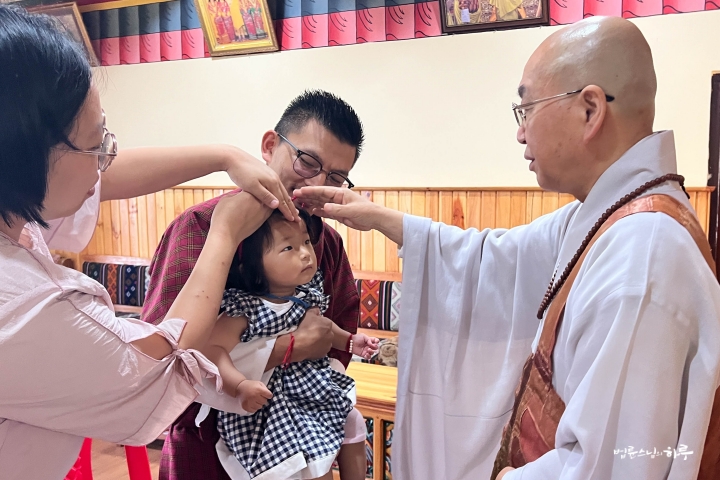
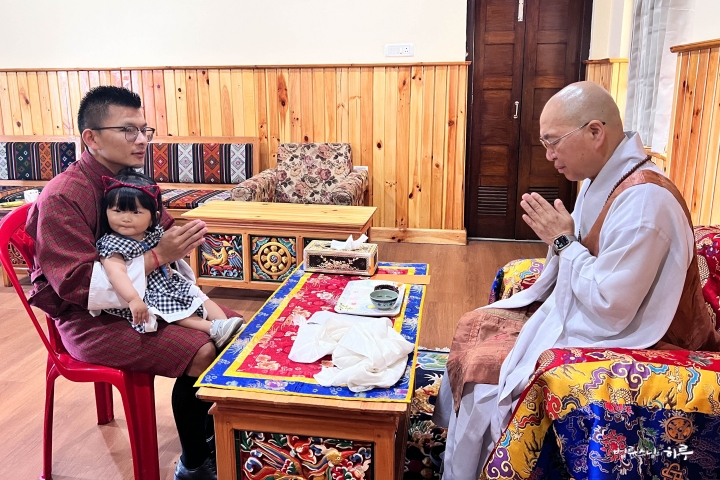
“Do you know what it means to apply water to the forehead in this consecration?”
When Mr. Norbu shyly said “I’m not sure,” Sunim smiled and said.
“It means to become a future Buddha.” (laughter)
“Thank you.”
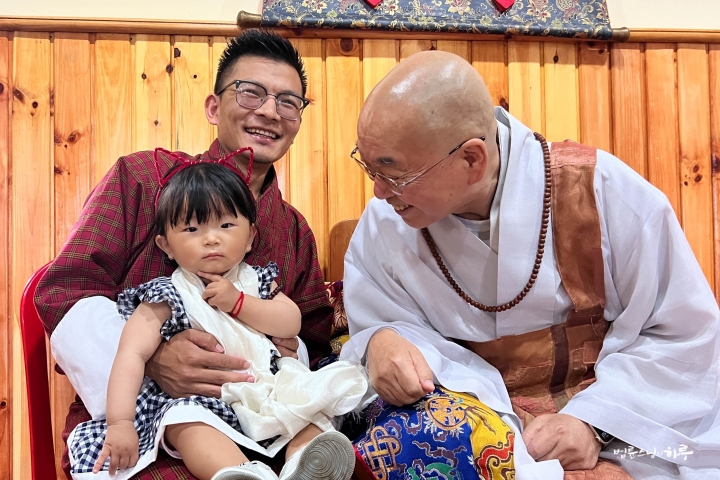
Sunim looked at the child with a warm smile. At 9 AM, he packed his belongings and left the accommodation. Sunim thanked the staff managing the accommodation and moved to the workshop venue.
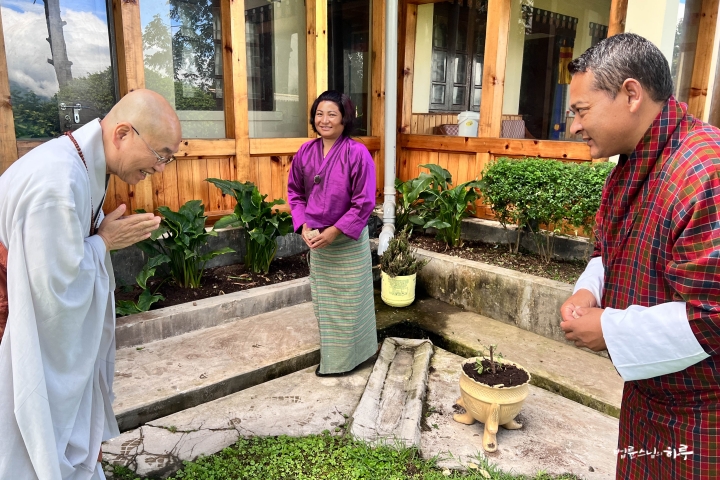
When Sunim arrived at the workshop venue, participants stood up to greet him. Representatives from each gewog and chiwog continued presenting their project plans from yesterday. Sunim listened quietly and offered thoughtful advice after each presentation.
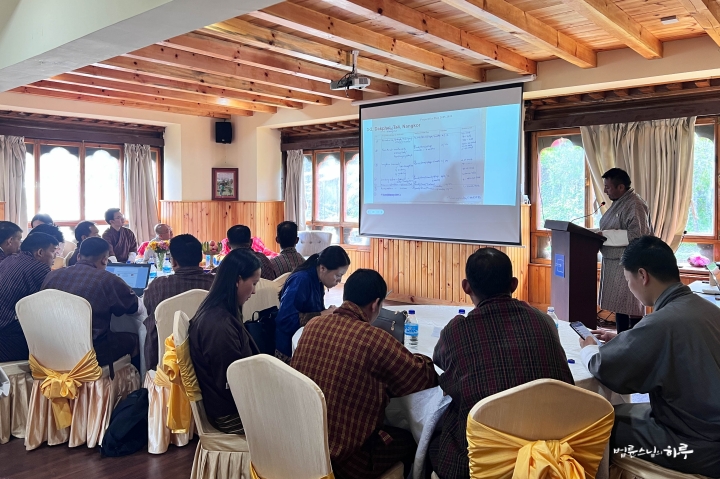
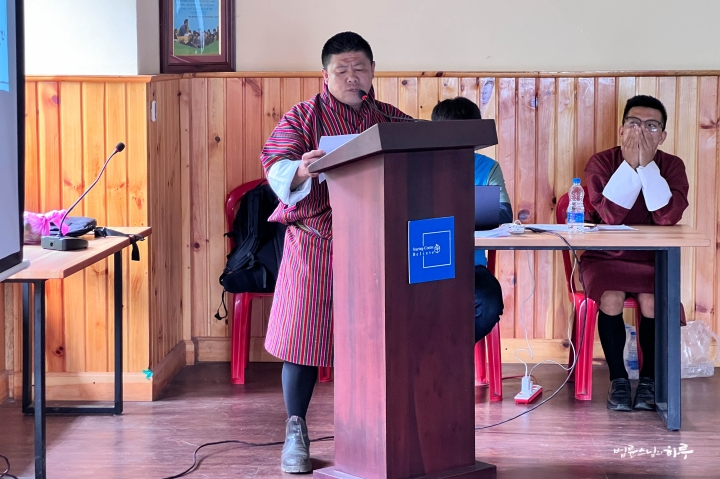
Many villages had set up road repair plans with sections longer than 300 meters. Sunim shared his opinion on this.
“For road repairs, only do the absolutely necessary sections where cars need to pass, about 10 meters here and there. Paving long sections should be applied for through government projects, not JTS support. Long sections are too difficult for the residents.”
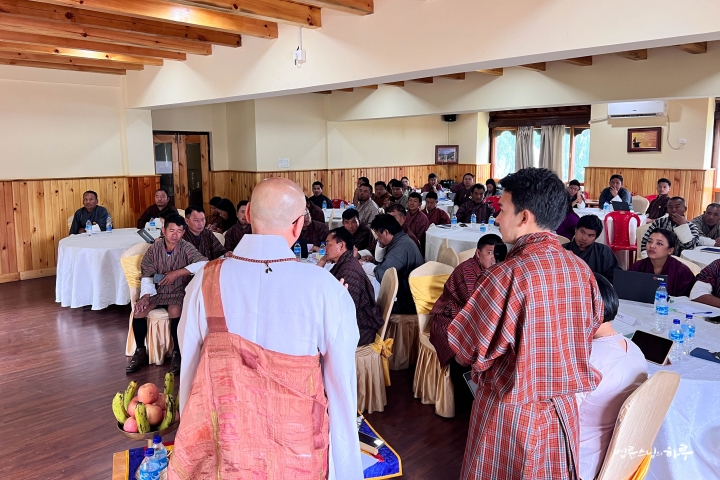
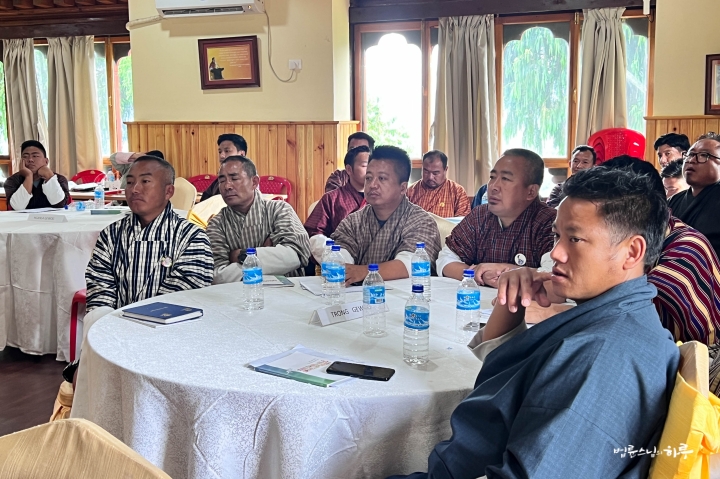
There were also more plans to build new houses than expected. Sunim shared his opinion again.
“It would be good to reduce the number of houses being built this year. Let’s proceed sequentially, starting with those who are truly in need.”
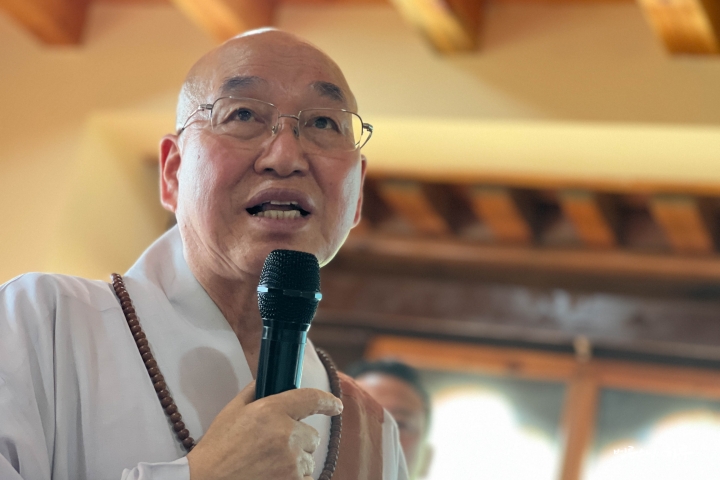
At 10:30 AM, they took a short break. Sunim and participants shared tea and Bhutanese dumplings while chatting.
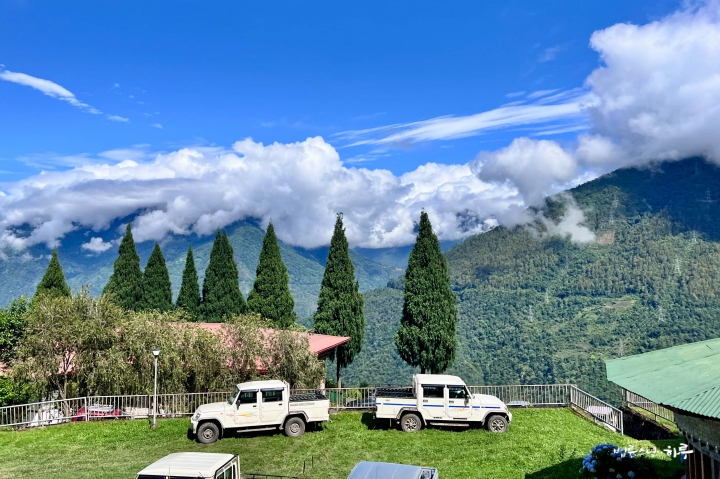
Presentations resumed at 11 AM. The Lamtang Tshogpa of Goshing Gewog presented plans for improving over 30 houses. Sunim smiled and said.
“At this rate, you’ll start a construction company.” (laughter)
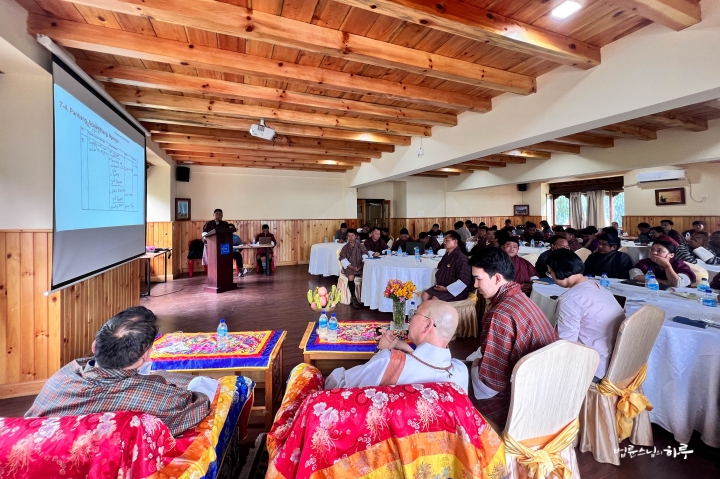
The participants laughed and nodded. Lamtang Tshogpa said.
“There are still many people without houses in Goshing Gewog. They are very poor, and in the past, there weren’t even roads, making it difficult to build houses. I also grew up in a bamboo house and only built a proper house in 2013. Many people still live in bamboo houses.”
“I see. Goshing Gewog will become a completely new village when this project is finished.”
Tashibi Chiwog proposed building a house for young bhikkhunis. Sunim spoke carefully.
“Since temples can receive offerings from villagers, how about waiting a little? Let’s survey first and then readjust priorities.”
Presentations and discussions concluded at 1 PM, followed by Sunim’s closing remarks.
“I’ve listened carefully to your project plans. I was truly moved hearing your thoughtful plans and presentations for your villages. Let me share a few thoughts.
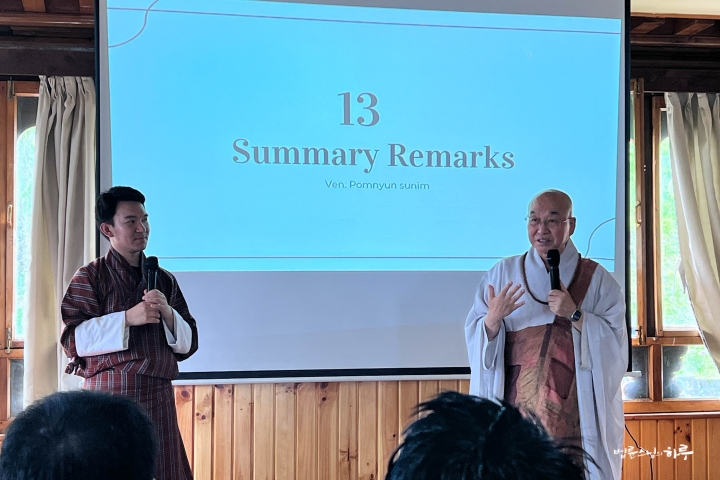
Experiment First, Then Expand Widely If Effective
First, let me talk about fence installation. Most of you want chain-link fences, but since that method is expensive, it would be good to apply for government projects. JTS wants to proceed with a relatively cheaper method that can still effectively keep animals out. Since we didn’t experiment enough during last year’s pilot project, we need to directly confirm what problems arise this year. We need to experiment for a year to find the most effective method – whether to raise the fence height, bury the wire mesh underground, or install it in an X-structure – and then expand using that method.
If we install fences for all 60 households this year and problems arise, it will be very difficult to fix later. So this year, let’s install for only about five houses, and expand the most effective method to everyone next year. Also, increasing from four to seven lines of wire mesh requires an enormous amount of materials, so we need to make samples this year and confirm the most effective method first. Then next year, we can order in bulk and buy materials cheaply. We could even pre-order next year’s quantity from the factory, or order from India or China for cheaper prices. So please reduce your plans to install fences for 60 households this year. This year, let’s experiment to find the best method and expand comprehensively next year.
Second, for road repairs, don’t do everything at once. It’s better to start with the most difficult sections, see the effects, and gradually expand. Of course, you want to fix all the roads where cars have difficulty passing, but distances over 300 meters require too many materials. While we’ll purchase cement, it would be good to find ways to source gravel and sand locally if possible. For steep slopes or areas that break easily, rather than using lots of cement, it’s better to lay wire mesh on the ground first and then pour concrete on top. This way, even if the ground sinks or cracks, the wire mesh holds the concrete together and prevents it from scattering. Let’s do a pilot project this way, confirm the effects, and then expand properly next year. Don’t try to do everything at once.
This year, don’t be too ambitious. Let’s proceed with building houses, repairs, and fence installations as pilot projects for practice, then increase the volume properly next year. Someone mentioned in the presentation that they’re worried the work might stop if people change due to elections next year. I understand that concern. However, village development must continue steadily regardless of elections. Even if someone else takes over, we need to pass on the experience well and continue step by step. Since this is the first time, there might be trial and error. But through trial and error, experience accumulates, and we can gradually expand. Let’s support the most difficult cases first, and if budget remains, gradually expand. After prioritizing repairs for poor people’s houses, if resources remain, we’ll also support temple repairs in villages. If we save a lot of budget and have surplus, let’s also support efforts to increase village income. Let’s focus the first phase on improving living conditions, and when we move to the second phase, let’s also research how to increase income.
Please don’t think of this project as simple village development, but as Buddhist work to save sentient beings from suffering. If you dedicate yourself to completing this Buddhist work well, you will accumulate greater merit than any you’ve accumulated so far. Let’s research and work together with such hearts for this Buddhist work to succeed. For this work to succeed well, we must do our best, but human power alone is insufficient. We need the protection of Buddha, Bodhisattvas, and Dharma protectors. Let’s pray together to Buddha, Bodhisattvas, and Dharma protectors for the perfect completion of this Buddhist work. Now, let’s all join our palms and pray together.”
Then the tshogpas who could chant came forward and began praying.
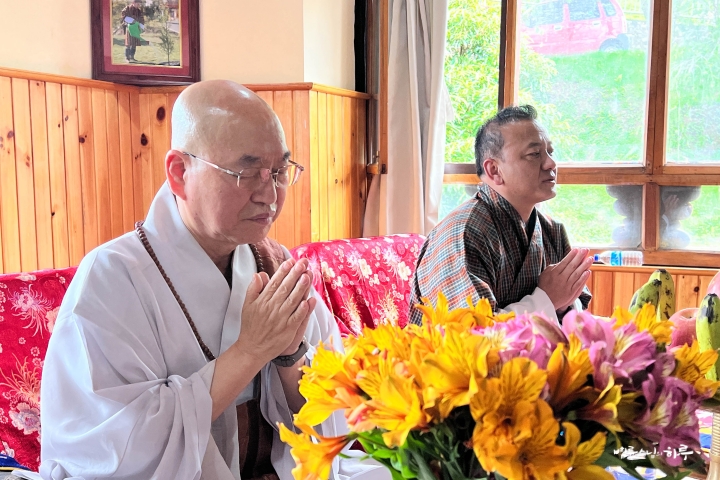
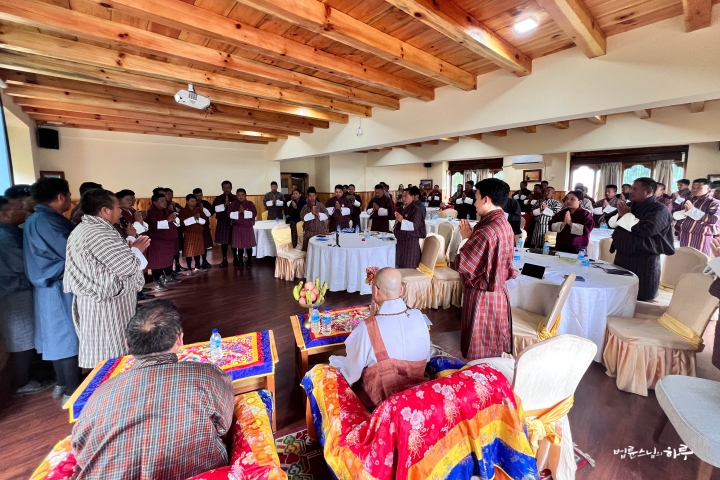
After everyone finished praying together with sincere hearts, Sunim gave words of encouragement again.
“Since we’ve offered prayers seeking the blessings of Buddha and Bodhisattvas, this project will surely succeed. Let’s also pray for the health of His Majesty the King, who works tirelessly day and night for the happiness of the Bhutanese people.
Today you’ve shared detailed stories about poor and struggling people in each village. Please make sure to propose such cases. First, formally propose to the local government and try to get approval for government support. If approval isn’t granted, JTS will prepare separate measures. During my last survey, I saw a young child whose hands were becoming stiff, students who needed to attend special schools due to intellectual disabilities, and elderly people with mental health conditions. Since there are a few such people in each village, please organize and report later, and we’ll review support together. However, please understand that the current JTS program is not for helping such difficult cases but for improving residents’ living conditions. Still, since there are people who need immediate help, I’ll discuss with the Zhemgang Governor about separate measures for supporting them.”
Finally, Sunim presented gifts to all attending officials. After giving towels, toothbrushes, and toothpaste, Sunim personally placed prayer beads around their necks.
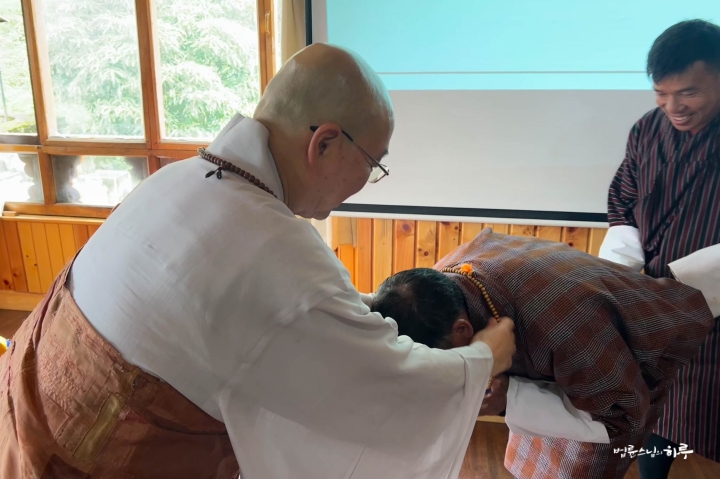
You Are Becoming Bodhisattvas Starting Today to Do This Work
“I brought these prayer beads from Bodh Gaya last winter. I’ll place one around each of your necks. The moment you receive these prayer beads, you become bodhisattvas. From today, you’re working together on Buddhist work as bodhisattvas, so you shouldn’t complain or harbor dissatisfaction when things get difficult.” (laughter)
Everyone wore the prayer beads Sunim gifted around their necks, went outside together for a commemorative photo, and concluded the Zhemgang workshop.
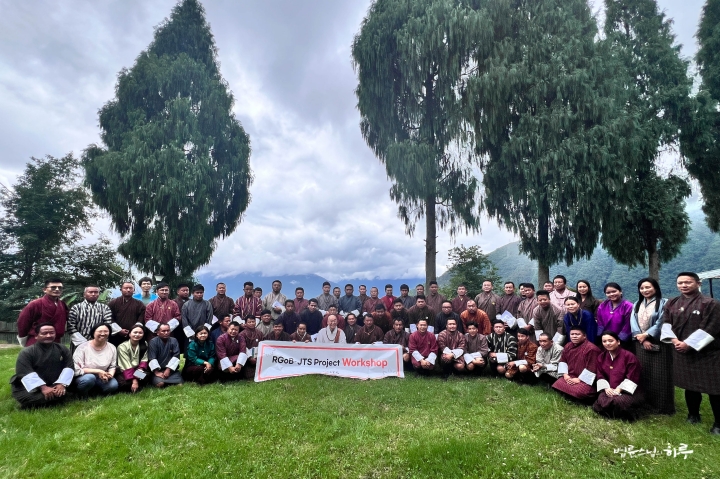
The workshop ended later than scheduled. Sunim and JTS volunteers had a quick lunch and hurriedly departed at 2 PM for their next destination, Pangkhar Gewog. They traveled downward along mountain roads for about 3 hours from 1,800 meters to 180 meters elevation. As the altitude decreased, the wind blowing through the car windows became hot and humid.
At 5 PM, they arrived at Pantang Chiwog in Pangkhar Gewog. Here was a new house built for a poor family as a JTS pilot project.
Sunim and the group got out of the vehicle and walked up to the house located on a hill. On the steep uphill path, Sunim stopped several times to catch his breath. Pantang Gewog, close to the Indian border, had low elevation and was filled with hot, humid air. Beads of sweat formed on Sunim’s forehead.
This house was home to a family raising two visually impaired children. Due to their difficult circumstances, they couldn’t secure a proper house for a long time, but with village recommendations, they finally got a new home through JTS support. Next to the newly built house, their old shabby house still remained.
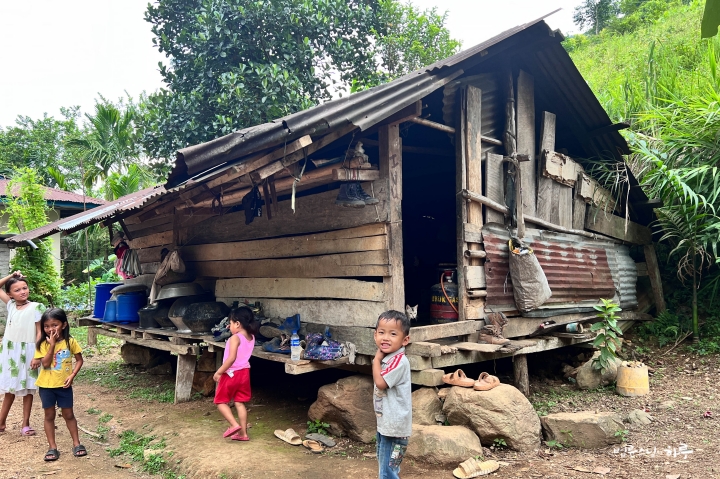
A white ribbon hung at the house entrance. Sunim and the Deputy Governor of Zhemgang untied the ribbon together to begin the completion ceremony.
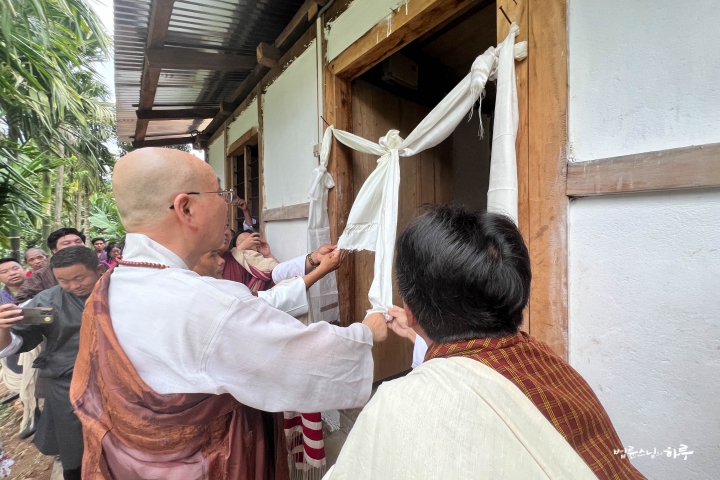
Upon entering the house, an altar was prepared in the living room. Sunim lit the candles.
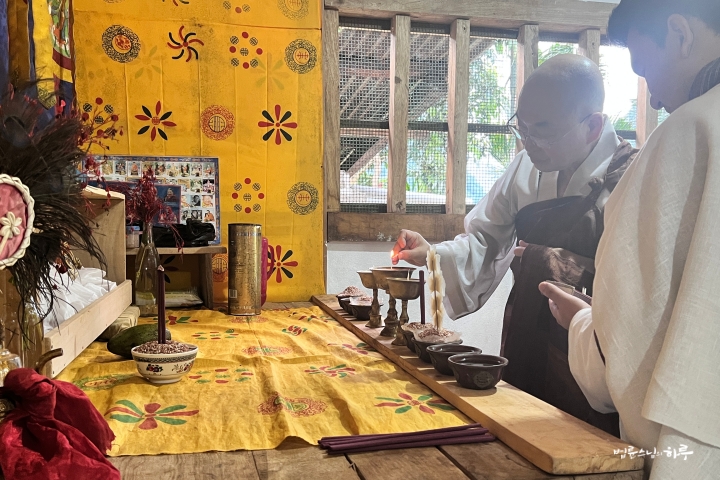
The homeowner couple came and prostrated three times, expressing their gratitude to Sunim.
“We’re so grateful beyond words.”
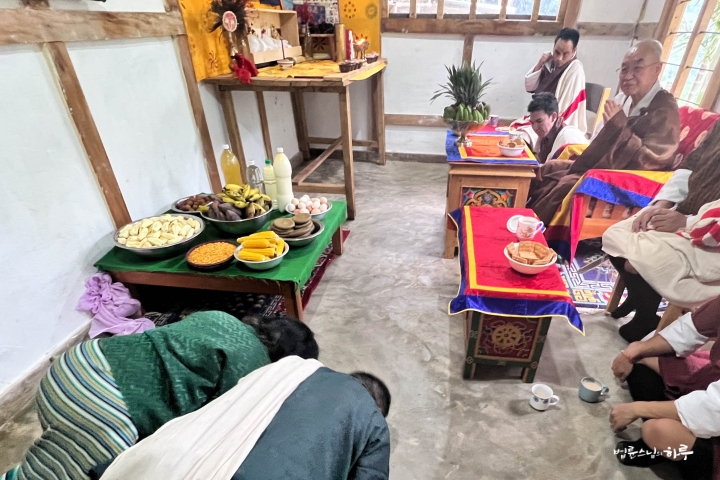
Sunim placed prayer beads around the couple’s necks and conveyed his congratulations. After exchanging greetings, Sunim walked through the house sprinkling fragrant water and giving blessings.
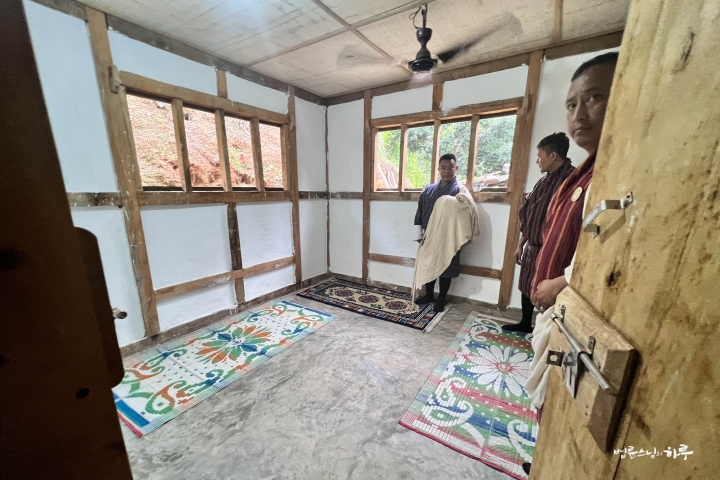
After finishing the blessing, the Deputy Governor said.
“They’ll be able to live in this house without problems for 30 years.”
The gup also expressed gratitude, saying “Without JTS support, we could never have built such a house in our lifetime.” Sunim also spoke while looking at the completed house.
“The house is built very conveniently. This level seems appropriate for houses newly built for poor people. Because if we build houses too nicely, people with shabby houses might feel dissatisfied.”
Sunim looked at Mr. Norbu, the Zhemgang administrator, and said.
“Mr. Norbu, you’ll have to build over 300 houses in the future. How will you handle all that merit? You’ll be crushed under all that blessing.” (laughter)
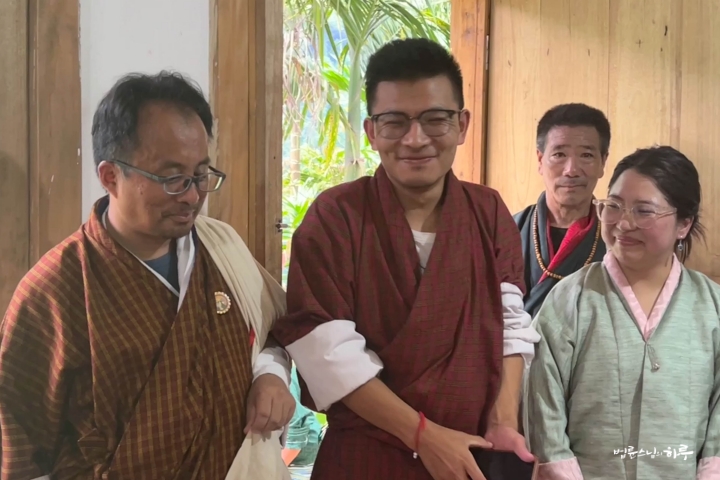
After completing the blessing ceremony, Sunim went outside and took a commemorative photo with the homeowners, their family, and the villagers before concluding the completion ceremony.
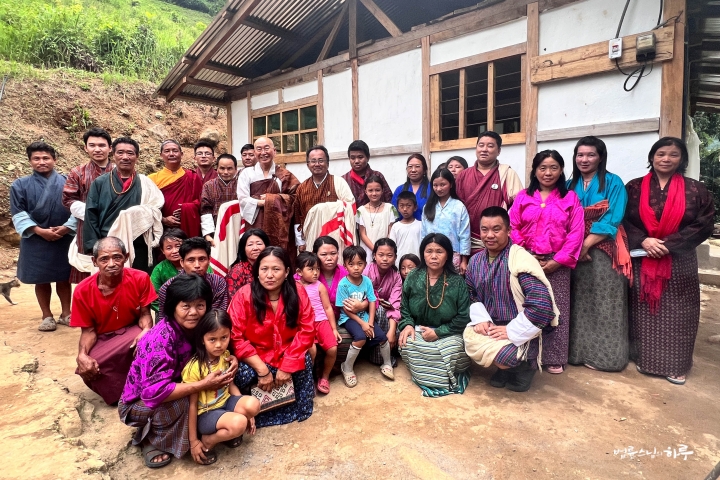
Sunim got back in the car and headed to the accommodation in Phuntshothang where the JTS volunteers were staying. Sunim invited Deputy Governor Jemgang and the Bhutanese government officials who were accompanying them to dinner. When Sunim’s group arrived, JTS volunteers and Indian volunteers from Sujata Academy were waiting with Indian food prepared.
However, the inside of the accommodation was very hot and the electricity kept going out. Eventually, they spread mats in the front yard and had dinner outdoors. Yeshi, a Bhutanese central government official, said with a smile:
“It feels like we’re on a picnic.”
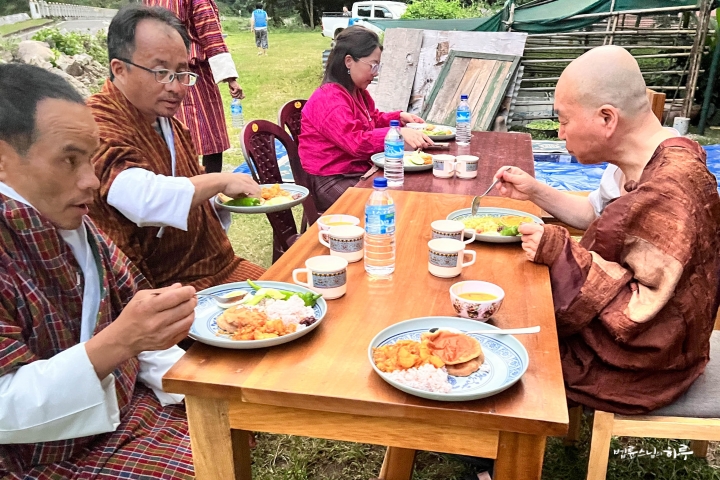
After everyone enjoyed the meal together, the Deputy Governor and the officials returned to their accommodation at 8 PM.
Sunim thanked the JTS volunteers for their hard work and gave them some pocket money. He also gave gifts to the Indian volunteers who came to serve in Bhutan, Babralji and Mahendraj, encouraging them by saying, “You’ve worked hard in a foreign land.”
Sunim then discussed the upcoming schedule with the JTS volunteers before concluding today’s activities.
Tomorrow, Sunim will travel to Zhemgang to inspect the progress of the kitchen project and have conversations with the residents. After attending a completion ceremony for a newly built house in Phuntshothang, he will visit the new Gelephu city in the afternoon.





